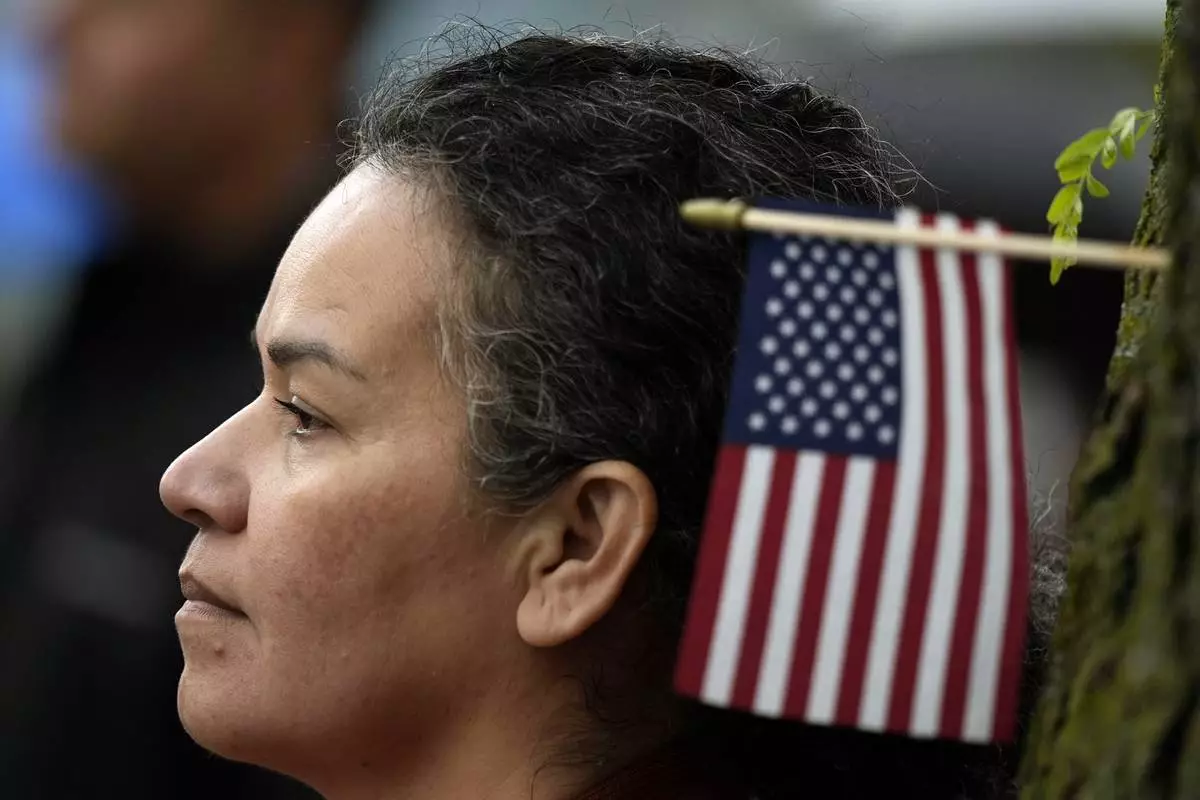A federal judge has dismissed a lawsuit by Elon Musk's X Corp. against the non-profit Center for Countering Digital Hate, which has documented the on the site since it was acquired by the Tesla owner.
X, formerly known as Twitter, had argued the center’s by improperly compiling public tweets, and that its subsequent reports on the rise of hate speech cost X millions of dollars when advertisers fled.
On Monday, U.S. District Court Judge Charles Breyer dismissed the suit, writing in his order that it was “unabashedly and vociferously about one thing" — punishing the nonprofit for its speech.
X had alleged that the nonprofit “scraped” its site for data, which is against its terms of service. But the judge found that X failed to “allege losses based on technological harms” — that is, the company didn't show how the scraping led to financial losses for X.
X had sought millions of dollars in damages, arguing that the nonprofit’s reports led to the exodus of advertisers and the loss of ad revenue.

FILE - Tesla and SpaceX's CEO Elon Musk looks on, during an in-conversation event with Britain's Prime Minister Rishi Sunak at Lancaster House in London, Thursday, Nov. 2, 2023. Former CNN reporter Don Lemon mixed it up with Musk in an interview Lemon posted on Musk's X social network Monday, March 18, 2024. (AP Photo/Kirsty Wigglesworth, Pool, File)
But the judge agreed with CCDH’s argument saying X cannot seek damages for the independent acts of third parties based on CCDH’s reports, or its “speech.”
The center is a nonprofit with offices in the U.S. and United Kingdom. It regularly publishes reports on , extremism or harmful behavior on social media platforms like X, or Facebook. The organization has published , detailing a rise in as well as since his purchase.
In a statement posted to X, the social media platform said it “disagrees with the court’s decision and plans to appeal.”
Imran Ahmed, the center’s founder and CEO, said the lawsuit amounted to a “hypocritical campaign of harassment” by a billionaire who talks about protecting free speech but who then uses his wealth to try to silence his critics. He said the lawsuit shows the need for a federal law requiring tech companies to release more information about their operations, so that the public can understand how these powerful platforms are shaping society.
“We hope this landmark ruling will embolden public-interest researchers everywhere to continue, and even intensify, their vital work of holding social media companies accountable for the hate and disinformation they host and the harm they cause,” said Ahmed.

FILE - Workers install lighting on an "X" sign atop the company headquarters, formerly known as Twitter, in downtown San Francisco, July 28, 2023. A federal judge has dismissed a lawsuit by Elon Musk's X Corp. against the non-profit Center for Countering Digital Hate, which has documented the increase in hate speech on the site since it was purchased by the Tesla owner. On Monday, March 25, 2024 U.S. District Court Judge Charles Breyer dismissed the suit, writing in his order that it was “unabashedly and vociferously about one thing" — punishing the nonprofit for its speech. (AP Photo/Noah Berger, File)
Roberta Kaplan, the center’s attorney, said the dismissal of X’s suit shows “even the wealthiest man cannot bend the rule of law to his will.”
“We are living in an age of bullies, and it’s social media that gives them the power that they have today,” Kaplan said in an email to reporters. “It takes great courage to stand up to these bullies; it takes an organization like the Center for Countering Digital Hate. We are proud and honored to represent CCDH.”
The center is not the only group that has pointed to the rise of hateful material on X since Musk’s purchase in October 2022. Last November, and its parent company Comcast, said that they stopped advertising on X after a report from the liberal advocacy group Media Matters said their ads were appearing alongside material praising Nazis. It was yet another setback as X tries to win back big brands and their ad dollars, X’s main source of revenue. X has also .
Later that month, Musk went on an in response to advertisers that halted spending on X in response to antisemitic and other hateful material, saying they are are engaging in “blackmail” and, using a profanity, essentially told them to go away.
DES MOINES, Iowa (AP) — A new law in Iowa that makes it a crime to be in the state if previously denied admission to the U.S. conflicts with federal law and could lead to the deportation of people who are legally in the country, civil rights and immigrant rights groups argue in a federal lawsuit filed Thursday.
The suit marks the first legal action taken against Iowa in response to the law, though the U.S. Department of Justice warned the state's top officials last week that the agency would sue unless they agreed not to enforce it.
The complaint filed in U.S. District Court alleges that the new statute steps on the federal government’s authority to enforce immigration law. The law is similar to a more expansive Texas statute that has been challenged by both the Justice Department and civil rights groups.
“This ugly law is deeply harmful to Iowa families and communities," said Rita Bettis Austen, legal director of The American Civil Liberties Union of Iowa. “Iowa lawmakers knowingly targeted people who are protected by federal immigration laws and who are legally allowed to be here.”
Iowa Attorney General Brenna Bird said Thursday that the state would not back down, and that the law existed because President Joe Biden hasn't secured the southern border.
“Iowa’s law is not unique; it simply enforces immigration laws while Biden refuses to," Bird said in a written statement. "Iowa stands ready to defend our immigration law that keeps Iowa communities safe.”
The ACLU of Iowa, national ACLU and the American Immigration Council filed the suit Thursday on behalf of the Iowa Migrant Movement for Justice and two individual Iowans.
The Iowa law has increased fear among immigrant communities in the state that enforcement would lead to racial and ethnic profiling, complicate interactions with police or dissuade community members from reporting crime. Activist and advocacy groups, including one named in the suit, have hosted gatherings to try to answer people’s questions and organized protests in response.
Texas was allowed to enforce the law for only a few confusing hours in March before it was put on hold by a federal appeals court’s three-judge panel. The panel heard arguments by both supporters and opponents in April, and will next issue a decision on the law’s constitutionality.
Some law enforcement officials and legal experts have said unanswered questions remain about how the laws in Iowa and Texas would be implemented, since enforcement of immigration law has historically fallen to the federal government and is a binational process.
The Iowa law, which goes into effect on July 1, would allow criminal charges to be brought against people who have outstanding deportation orders or who previously have been removed from or denied admission to the U.S. Once in custody, migrants could either agree to a judge’s order to leave the U.S. or be prosecuted, potentially facing time in prison before deportation.
The Iowa lawsuit contends that the law conflicts with federal law and could direct police to arrest people who are authorized to be in the U.S., such as people who have been granted asylum or have visas. The suit said the law could result in the prosecution of children brought to Iowa by their parents.
"It will create absolute chaos and human suffering in our legal system, and harm Iowa communities,” said Melloy Goettel, legal director at the American Immigration Council.
Gov. Kim Reynolds, a Republican who signed the new legislation into law, reiterated her support for the change.
“As Governor, I have a responsibility to protect the citizens of Iowa," Reynolds said in a written statement that repeated the arguments of other Republican leaders. "Since President Biden refuses to enforce our nation’s immigration laws — threatening the safety of our citizens — Iowa will step in.”

FILE - People march during an Iowa Movement for Migrant Justice rally and march, Wednesday, May 1, 2024, in Des Moines, Iowa. (AP Photo/Charlie Neibergall, File)

FILE - A woman listens to a speaker during an Iowa Movement for Migrant Justice rally and march, Wednesday, May 1, 2024, in Des Moines, Iowa. Civil rights and immigrant rights groups Thursday, May 9, 2024, are suing Iowa over a new law that makes it a crime to be in the state if previously denied admission to the U.S. (AP Photo/Charlie Neibergall, File)

FILE - People listen to a speaker during an Iowa Movement for Migrant Justice rally and march, Wednesday, May 1, 2024, in Des Moines, Iowa. Civil rights and immigrant rights groups Thursday, May 9, 2024, are suing Iowa over a new law that makes it a crime to be in the state if previously denied admission to the U.S. (AP Photo/Charlie Neibergall, File)

FILE - A woman listens to a speaker during an Iowa Movement for Migrant Justice rally and march, Wednesday, May 1, 2024, in Des Moines, Iowa. Civil rights and immigrant rights groups Thursday, May 9, 2024, are suing Iowa over a new law that makes it a crime to be in the state if previously denied admission to the U.S. (AP Photo/Charlie Neibergall, File)















